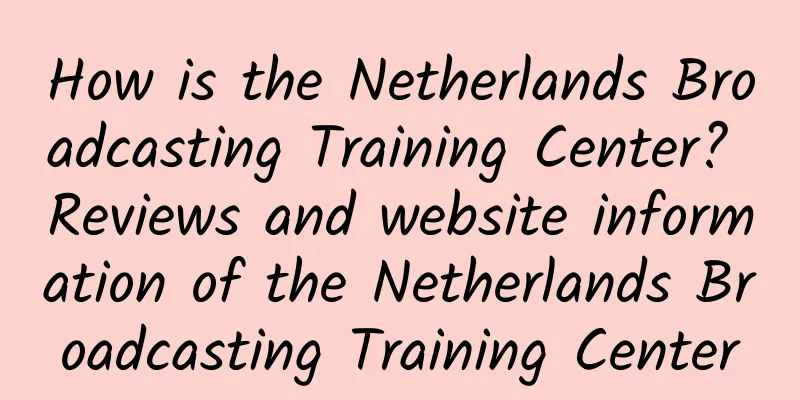How is the Netherlands Broadcasting Training Center? Reviews and website information of the Netherlands Broadcasting Training Center

|
What is the website of the Netherlands Broadcasting Training Centre? The Netherlands Broadcasting Training Centre (RNTC) is a high-quality knowledge center in the fields of media, development and education in the Netherlands. It is committed to the research and promotion of the professionalization and efficient use of the media industry in developing and transitional countries, and provides a series of projects to support the development of the media industry and the efficient use of media to help development (especially in developing and transitional countries). Website: www.rntc.nl Netherlands Broadcasting Training Centre: Knowledge and Power for Media DevelopmentIn today's globalized world, the media plays a vital role. It is not only a channel for the dissemination of information, but also an important tool for promoting social change, promoting economic development and raising public awareness. However, in many developing and transition countries, the media industry faces many challenges, including insufficient resources, lack of professional skills and insufficient understanding of the role of the media. In response to these challenges, the Netherlands Broadcasting Training Center (RNTC) came into being and became a beacon in the international media field. RNTC, the full name of which is Radio Netherlands Training Centre, is a knowledge center focusing on media, development and education. As a well-known institution in the Netherlands, RNTC is committed to helping media practitioners in developing and transitional countries improve their professional capabilities by providing high-quality training programs and resources, and using the power of media to promote social progress and sustainable development. This article will explore RNTC’s historical background, core mission, training programs, and its unique role in the global media industry. At the same time, we will analyze how RNTC can help the professionalization and efficient use of the media industry through innovative methods and international cooperation, injecting new vitality into global media development. RNTC's History and Vision: From Broadcasting to Global Media CentreRNTC's history dates back to the 1950s, when Radio Nederland Wereldomroep began to provide news and cultural programming to a global audience. Over time, RNTC evolved into an independent institution focused on media training and development. Today, RNTC has become a globally recognized media knowledge center dedicated to promoting the professionalization of the media industry through education and capacity building. RNTC's core vision is to "make media a force for change". This vision reflects the organization's deep understanding of the potential of media - media is not only a tool for information dissemination, but also a powerful weapon to inspire public participation, promote policy changes and social progress. In order to achieve this vision, RNTC focuses on the following aspects:
RNTC's mission is not limited to training individuals, but also to building strong media networks, promoting knowledge sharing and international cooperation. In this way, RNTC hopes to promote professionalism and transparency in the media industry worldwide, thereby contributing to social development and democratization. RNTC Core Project: From Theory to PracticeRNTC offers a wide range of training programs, covering all levels from basic skills training to advanced leadership development. These programs are designed to combine theoretical learning and practical operations to ensure that participants can apply what they have learned in a real environment. The following are some of RNTC's core programs and their features: News reporting and editing skillsThis program aims to improve the interviewing, writing and editing skills of journalists. Participants will learn how to identify news value, build story frames and conduct in-depth investigations. In addition, the course also includes multimedia reporting skills to enable participants to adapt to the media needs of the digital age. Program Production and Audio Visual TechnologyAs media forms diversify, the importance of audio and video content is increasing. RNTC's program production course teaches participants how to plan, produce and publish high-quality audio and video content. Course content includes script writing, recording technology, post-production and distribution strategies. Social Media & Digital MarketingIn today's digital age, social media has become an important platform for media communication. This RNTC program helps participants master social media strategic planning, content creation and data analysis skills to better attract and maintain audiences. Media Management and Leadership DevelopmentEffective management and leadership skills are essential for managers of media organizations. The RNTC program provides training on strategic planning, financial management, team building and crisis management to help participants improve their leadership and management skills. In addition to the above core projects, RNTC also regularly organizes seminars and workshops on hot social issues such as gender equality, environmental issues, health and well-being, etc. These activities not only enrich the knowledge of participants, but also enhance their awareness of social responsibility. RNTC’s teaching methods: interactive and innovativeRNTC's success is inseparable from its unique teaching method. The institution adopts a highly interactive and practice-oriented learning model to ensure that participants can fully absorb and apply what they have learned. The following are some key features of RNTC's teaching method:
RNTC's teaching method emphasizes practice and reflection, encouraging participants to apply what they have learned to actual work and continuously improve through feedback and discussion. This practice-oriented learning method makes RNTC's training programs highly practical and effective. RNTC's Global Impact: Collaboration and PartnershipRNTC's influence extends far beyond the borders of the Netherlands. As an international organization, RNTC has established extensive partnerships with media organizations, non-governmental organizations and academic institutions around the world. These partnerships not only expand RNTC's training coverage, but also create more opportunities for communication and cooperation in the global media industry. RNTC pays special attention to cooperation with developing countries and transition countries. Through close collaboration with local partners, RNTC is able to better understand the specific needs of these countries and tailor corresponding training programs. For example, RNTC has worked with media organizations in several African countries to jointly develop news reporting and program production courses suitable for local culture. In addition, RNTC actively participates in various international conferences and forums to share its experience and achievements in media training and development. Through these activities, RNTC further consolidates its leading position in the global media field. Future prospects of RNTC: continued innovation and expansionIn the face of a rapidly changing media environment and technological advances, RNTC has always maintained its keen insight and innovation capabilities. In the future, RNTC plans to continue to expand and deepen its work in the following areas:
In short, RNTC is not only a media training center, but also a knowledge platform to promote social progress. By continuously innovating and expanding its work areas, RNTC will continue to play an important role in the global media industry and contribute to the realization of a more just and equal society. Visit the RNTC official website: www.rntc.nl |
<<: How is Tiger? Tiger review and website information
Recommend
How to fry yam and make it delicious
Chinese yam is a top-grade root vegetable. It has...
How is the University of Western Australia? University of Western Australia reviews and website information
What is the website of the University of Western A...
How to pickle pomelo peel How to make pomelo peel
Huyou is a kind of pomelo, a fruit with a slightl...
How to eat dried red dates? Is it better to eat dried red dates or soak them in water?
Dried red dates are a common dry food ingredient ...
What are the uses of white vinegar?
White vinegar is a type of edible vinegar, named ...
The efficacy and function of large persimmon leaves The medicinal value of large persimmon leaves
The big and delicious tomato is the favorite frui...
The difference between hot pear juice and warm pear juice. The benefits of drinking pear juice
Pear juice is a sweet and nutritious drink that r...
The difference between peaches and flat peaches
Both flat peaches and peaches are common fruits i...
The pros and cons of eating hot peppers
Spicy pepper is a common food ingredient. It is a...
What is the United Nations International Seabed Authority like? United Nations International Seabed Authority reviews and website information
What is the website of the United Nations Internat...
Yuanzu Snow Mooncake Shelf Life
I believe everyone eats mooncakes, but have you e...
How to make watermelon juice and precautions for drinking watermelon juice
I believe everyone is familiar with watermelon ju...
How is the Chinese Embassy in Azerbaijan? Reviews and website information of the Chinese Embassy in Azerbaijan
What is the website of the Chinese Embassy in Azer...
The efficacy and function of Cassia seed porridge The taboos of Cassia seed porridge
Cassia seed is the seed of the wild medicinal pla...
The efficacy, effects and precautions of ear picking
Ear cleaning is a popular health care item in rec...









